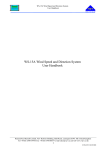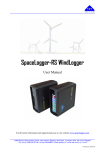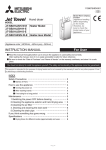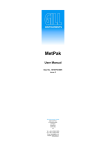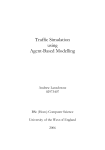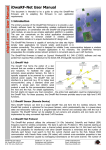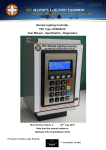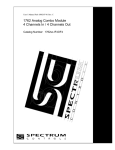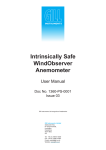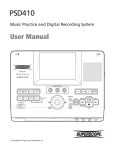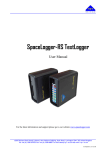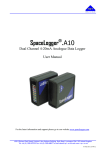Download WS-15A Display Unit Wind Speed and Direction System User
Transcript
WS-15A Display for Wind Speed and Direction System User Handbook WS-15A Display Unit for Wind Speed and Direction System User Handbook -1015SL015/12 10/09/10 WS-15A Display for Wind Speed and Direction System User Handbook © Copyright 2005-2010 Richard Paul Russell Limited Document revision summary Issue 1 2 3 4 5 6 7a 8 9 10 11 12 Date March 2005 April 2005 May 2005 September 2005 January 2006 May 2006 March 2007 April 2007 September 2008 March 2009 August 2009 September 2010 Description Original document for use with WS-15A software version 1.1a Detail added Detail added Connection correction Audible Alarm connections Add WEEE directive caution and Audible Alarm tone settings Add feature to switch off wind compass point display. Add caution for wiring prior to power application & installation in high winds/lightning. Add 24V DC Alarm Sounder connections Update software version to 2.2a (see Issue 1 above). Adjust orientation of Menu Flowchart Software updated to version 2.3c. Compatibility with WindObserver and NMEA sensors added. Radio modem functionality added. Menu structure revised. Modified wind alarm silencing. Detail added Updated for software version 2.4a. Compatibility with MetPak II sensor added. -2015SL015/12 10/09/10 WS-15A Display for Wind Speed and Direction System User Handbook 1 INTRODUCTION .................................................................................................................... 4 2 INSTALLATION ...................................................................................................................... 6 2.1 WS-15A Location ............................................................................................................... 6 2.2 Wiring ................................................................................................................................. 7 2.2.1 Cables ............................................................................................................................. 7 2.2.2 Termination Preparation .................................................................................................. 8 2.2.3 Generic Terminal Allocations ........................................................................................ 11 2.2.4 Wind Sensor Connections .............................................................................................. 12 2.2.5 Radio Modem Connections ............................................................................................ 17 2.2.6 Audible Alarm Sounder Connections ............................................................................. 18 2.2.7 Alarm Sounder Options ................................................................................................. 18 2.2.8 SpaceLogger-RS™ WindLogger Connections ............................................................... 20 3 OPERATIONAL PROCEDURES ............................................................................................ 21 3.1 Detailed Operation ............................................................................................................ 21 3.1.1 Entry at Switch On – Banner Display ............................................................................ 22 3.1.2 Wind Data Display ........................................................................................................ 22 3.1.1 Other Data Displays....................................................................................................... 22 3.1.2 Display Settings ............................................................................................................. 24 3.1.3 Sensor Settings .............................................................................................................. 25 3.1.4 Barometric Pressure Calibration .................................................................................... 26 3.1.5 Wind Speed Alarm ........................................................................................................ 26 3.1.6 Data Output ................................................................................................................... 28 4 4.1 WS-15A DISPLAY UNIT SPECIFICATION........................................................................... 30 Specification ..................................................................................................................... 30 4.2 I/O Capability.................................................................................................................... 31 4.2.1 Data format from WindSonic sensor .............................................................................. 31 4.2.2 Data format from WindObserver sensor......................................................................... 31 4.2.3 Data format from NMEA sensor .................................................................................... 32 4.2.4 Data format from MetPak II........................................................................................... 33 4.2.5 To WindLogger or Other Device: .................................................................................. 33 5 APPENDICES ........................................................................................................................ 34 5.1 A1. Error Codes ................................................................................................................ 34 5.2 A2. Audible Alarm Tone settings ...................................................................................... 35 5.3 A3. Guarantee ................................................................................................................... 36 3.1 A4. Electromagnetic Conformity ....................................................................................... 37 -3015SL015/12 10/09/10 WS-15A Display for Wind Speed and Direction System User Handbook 1 INTRODUCTION The WS-15A display is designed to provide wind speed and direction data display, alarm annunciation and RS232/485 conversion for a range of ultrasonic anemometer sensors. It is compatible with the following sensors: • WindSonic option 1, 2 or 3 when set to output via RS232 or RS422/485 or NMEA 0183 • WindObserver II when set to output RS422/485 or NMEA 0183 • Other Wind Sensors generating NMEA 0183 sentences of type MWV • MetPak II configured to output wind direction, wind speed, pressure, humidity, temperature, dew point and supply voltage at 9600 baud. WindSonic Sensors WindSonic Option 1: WindSonic 1 sensors transmit using RS232 standard communications and are suitable when the connection distance between the sensor and the WS-15A Display is less than 20 metres and the electrical environment is benign. WindSonic option 2: For connection distances which are in excess of 20 metres, or where there may be heavy duty electrical equipment being switched or in operation in the vicinity, the WindSonic 2 sensor is appropriate, which uses the more robust RS422/RS485 communication standard. WindSonic Option 3: The WindSonic 3 sensor is also compatible with the WS-15A display if it is set to output using RS422/485. To be compatible with the WS-15A Display, the data format of the WindSonic sensor should be set to the default ASCII polar continuous (not polled) or to NMEA. WindObserver II sensors WindObserver II sensors should be set to transmit using the RS422/485 communication standard. To be compatible with the WS-15A Display, the data format of the sensor should be set to the default ASCII polar continuous (not polled) or to NMEA. MetPak II multi sensor The MetPak II consists of a single instrument combining wind speed and direction, pressure, temperature, and relative humidity sensors. To be compatible with the WS15A display the MetPak II must be set up to output data in the order and measurement units given in section 4.2.4 Data format from MetPak II on page33 of this handbook. -4015SL015/12 10/09/10 WS-15A Display for Wind Speed and Direction System User Handbook The WS-15A Display is housed in a robust IP65 standard case with three cable glands as standard providing access for wiring to power supply, sensor and audible alarm. As an option, an additional cable gland can be fitted for an RS232 connection to other devices such as another WS-15A display, computer, radio modem or data logger. A typical system configuration is shown below in Figure 1 comprising an ultrasonic wind speed and direction sensor connected to and powered by the WS-15A display connected to an audible alarm and also a data logger (WindLogger) unit. WindSonic Sensor WS-15A Display Unit Audible Alarm Sounder WindLogger Data Logger 12v Power Supply Figure 1: Typical wind speed and direction system using the WS-15A display The system requires a 9 volt to 30 volt DC supply which can be provided by a 12 or 24 volt battery or a small plug-in mains power unit. -5015SL015/12 10/09/10 WS-15A Display for Wind Speed and Direction System User Handbook 2 INSTALLATION This section of the document describes the installation requirements of the display unit and audible alarm sounder. Installation instructions for the sensor are found in the WindSonic or WindObserver user manual supplied with the sensor. In order to ensure accurate and consistent wind data, please address particular attention to the installation guidelines section. Installation instructions for the SpaceLogger-RS WindLogger are to be found in the user manual supplied with the unit or by visiting www.spacelogger.com. NB. Please note that interconnection of all components should be completed prior applying power, and that installation the WindSonic sensor and associated cabling should not be undertaken in conditions of high wind strength or risk of lightning. 2.1 WS-15A Location The WS-15A Display is housed in an IP65 protected case designed to withstand moderate exterior weather conditions and is classed as shower proof. However, it is recommended that the unit should be installed either indoors or in a sheltered area. Note that if a mains plug-in power unit is being used, it is unlikely to be suitable for an exterior location. Check the power unit’s instructions. The display should be mounted at eye height or angled so the user is looking directly at the display to obtain best visibility of the data display. See Figure 2 below. Figure 2: WS-15A Display Mounting -6015SL015/12 10/09/10 WS-15A Display for Wind Speed and Direction System User Handbook The WS-15A can be surface mounted using 4mm fixing holes in the rear of the unit or using the four mounting brackets supplied. Mounting brackets and fixing centres and are indicated in Figure 3 and Figure 4 below. Figure 3: Mounting brackets 108mm 4mm WS 15 A Unit Base 50mm Figure 4: Fixing Centres (without mounting brackets) When the mounting brackets are used, the 108mm and 50mm fixing centres are increased to 130mm and 68mm respectively. 2.2 Wiring 2.2.1 Cables Users should ensure that, where necessary, all cables are suitable for outside installations. Cables should be adequately protected from potential damage from physical vibration or abrasion, excessive temperatures and aggressive atmospheric conditions. Either solid or stranded cable is acceptable, in the range 0.32 to 0.65 mm diameter (AWG 28 to 22) with gauge 24 being ideal. Signal cables should be routed as far as possible away from any adjacent cables or equipment which might be carrying high current or switching loads. -7015SL015/12 10/09/10 WS-15A Display for Wind Speed and Direction System User Handbook 2.2.2 Termination Preparation WS-15A terminals are located on the rear of the unit printed circuit board. These are convenient lever action and blocks are colour coded and numbered for ease of identification. Orange White Yellow Pink Brown Terminals1 – 3 Terminals 4 – 12 Terminals 13 – 19 Terminals 20 – 23 Terminals 24 – 29 Power input connections Sensor power and signal connections Radio modem connections Alarm annunciator connections Data logger (WindLogger) connections Miniature slide switch ‘I’ position Figure 5: Terminal Strip Arrangement When the unit base has been mounted, ready for wiring, the two temporary support rods supplied should be fitted to the front panel using the front panel fixing screws as shown in Figure 6. -8015SL015/12 10/09/10 WS-15A Display for Wind Speed and Direction System User Handbook Figure 6: Front panel support rods These rods enable the front panel to be ‘slotted’ into channels in the base unit with the circuit board terminals upwards. With the front panel supported, the terminal strip is accessible for easy wiring. Figure 7: Supported terminal strip ready for wiring Wiring should be in accordance the following tables (Table 1 to Table 14). These tables should be read in conjunction with Figure 5. -9015SL015/12 10/09/10 WS-15A Display for Wind Speed and Direction System User Handbook To ease connection, the cores should be prepared as follows:9 to 10mm 50mm Figure 8: Cable Preparation It is important that the stripped ends be accurately 9-10mm long to ensure good connections in the terminals. There is a 10mm gauge at the end of the orange terminal block. Screens and drain wires should be sheathed. To insert a wire into a spring terminal, first strip the insulation leaving 9 to10 mm of bare wire exposed as indicated in Figure 8 Using a small flat headed screw-driver fully depress the grey plunger for the required terminal (see Figure 7) and insert the wire as far as it will go, into the hole below the plunger. Release the grey plunger and the wire is held captive by the connector. A gentle tug on the wire will confirm that it is held firmly. If the wire in question is multi-strand, ensure that all strands are inserted in the terminal hole. When all cores have been fitted, carefully unscrew and remove the temporary rods and fit the front panel to the base unit. t Warning: All GNDs and Screen terminals in the WS-15A Display are common and so damage to the unit may result if they are connected to different voltages. - 10 015SL015/12 10/09/10 WS-15A Display for Wind Speed and Direction System User Handbook 2.2.3 Generic Terminal Allocations Table 1 WS-15A Terminal 1 2 3 Screen Power GND Supply +V (+9 to 30V dc) 4 5 6 7 8 9 10 11 12 NMEA/Optical Rx input NMEA/Optical signal GRD Screen Power GND +V supply output Signal GND RS232 Rx RS485A RS485B 13 14 15 16 17 18 19 Drain wire Power GND +V supply RS232 Tx output (serial out) RS232 Rx input (serial in) CMD output Reserved for future use 20 21 22 23 GND + V supply output Relay A Relay B Alarm 24 25 26 27 28 29 Screen Power GND +V supply output RS232 Rx input RS232 Tx output +5V output Data Logger (WindLogger) Signal description Use Power Wind Sensor See tables in section 2.2.4 for specific RS232/RS485/NMEA connections Radio Modem - 11 015SL015/12 10/09/10 WS-15A Display for Wind Speed and Direction System User Handbook 2.2.4 Wind Sensor Connections The WS-15A Display is compatible with a number of wind speed and direction sensors. These comprise the WindSonic range (options 1 to 3), WindObserver range and generic NMEA 0183 version 3 devices outputting the MWV sentence. Note that WindSonic and WindObserver sensors can be configured to transmit NMEA sentences, but their default transmission rate of 9600 baud is non compliant with the standard NMEA rate of 4800 baud. The WS-15A is also compatible with sensors communicating via radio modems and in this mode, in conjunction with the WindSonic/Observer ranges, has a facility to display signal strength to aid link set up and fault finding. The following Table 2 indicates the most common connection configurations which will be encountered. Sensor Model WindSonic 1 WindSonic 2 or 3 WindSonic 2 or 3 WindObserver II NMEA (9600 baud)* NMEA (4800 baud) WindSonic via Radio modem WindObserver via Radio modem NMEA (9600 baud) via Radio modem MetPak II MetPak II WS-15A Sensor Type WindSonic Input I/O Switch setting RS232 Either position WindSonic RS485 ‘I’ position WindSonic RS232 Either position WindObserver RS485 ‘I’ position NMEA OPTICAL ‘O’ position NMEA NMEA WindSonic RADIO WindObserver RADIO NMEA RADIO MetPak II RS232 MetPak II RS485 Connection Table applicable Table 3 Table 5 Table 3 Table 7 Windsonic 1, 2 or 3(RS232) - Table 4 Windsonic 2 or 3(RS485) - Table 6 WindObserver - Table 8 ‘O’ position Table 9 Either position Either position Either position Either position ‘I’ position Table 12 Table 12 Table 12 Table 10 Table 11 Table 2 * - When any of the WindSonic or WindObserver ranges are configured to transmit NMEA, they are considered by the WS-15A to be NMEA type. - 12 015SL015/12 10/09/10 WS-15A Display for Wind Speed and Direction System User Handbook 2.2.4.1 Connection Table for WindSonic sensors 1, 2 and 3 using RS232 Table 3 WS-15A Terminal 4 5 6 7 8 9 10 11 12 Description Not used Not used Screen Power GND +V supply output Signal GND RS232 Rx Not used Not used WindSonic 1 WindSonic 2 or 3 Cable screen WindSonic pin 2 WindSonic pin 3 WindSonic pin 1 WindSonic pin 5 Cable screen WindSonic pin 3 WindSonic pin 2 WindSonic pin 1 WindSonic pin 5 Note: Power connections are reversed between Option 1 sensor and Option 2 or 3 sensors 2.2.4.2 Connection Table for WindSonic sensor (with RS232 output) using NMEA or Optical Table 4 WS-15A Terminal 4 5 6 7 8 9 10 11 12 Description WindSonic pin 5 WindSonic pin 1 WindSonic 2 or 3 (output via RS232) WindSonic pin 5 WindSonic pin 1 WindSonic pin 2 WindSonic pin 3 WindSonic pin 3 WindSonic pin 2 WindSonic 1 NMEA/Optical Rx input NMEA/Optical signal GRD Not used Power GND +V supply output Not used Not used Not used Not used Notes: 1. When the NMEA or Optical input is used the small slide switch near the white sensor terminals must be in the O position. (See Figure 5). 2. Power connections are reversed between Option 1 sensor and Option 2 or 3 sensors. - 13 015SL015/12 10/09/10 WS-15A Display for Wind Speed and Direction System User Handbook 2.2.4.3 Connection Table for WindSonic sensor 2 or 3 using RS422/485 Table 5 WS-15A Terminal 4 5 6 7 8 9 10 11 12 Description Not used Not used Screen Power GND +V supply output Not used Not used RS485A RS485B WindSonic 2 or 3 Cable screen WindSonic pin 3 WindSonic pin 2 WindSonic Pin 5 WindSonic Pin 4 Note: When the RS485 input is used the small slide switch near the white sensor terminals must be in the I position. (See Figure 5). When the RS232 input is used, the position of this switch has no significance and may be in either position. 2.2.4.4 Connection Table for WindSonic sensor 2/3 (with RS422/485 output) using NMEA or Optical Table 6 WS-15A Terminal 4 5 6 7 8 9 10 11 12 Description NMEA/Optical Rx input NMEA/Optical signal GRD Not used Power GND +V supply output Not used Not used Not used Not used WindSonic 2 or 3 (output via RS422/485) WindSonic pin 5 WindSonic pin 4 WindSonic pin 3 WindSonic pin 2 Note: When the NMEA or Optical input is used the small slide switch near the white sensor terminals must be in the O position. (See Figure 5). - 14 015SL015/12 10/09/10 WS-15A Display for Wind Speed and Direction System User Handbook 2.2.4.5 Connection Table for WindObserver II using RS422/485 Table 7 WS-15A Terminal 4 5 6 7 8 9 10 11 12 Description Not used Not used Screen Power GND +V supply output Not used Not used RS485A RS485B WindObserver II conductor Cable screen Pair 3 – black Pair 3 – red Pair 4 – blue Pair 1 – black Pair 1 - green Note: When the RS485 input is used the small slide switch near the white sensor terminals must be in the I position. (See Figure 5). 2.2.4.6 Connection Table for WindObserver II using NMEA or Optical Table 8 WS-15A Terminal 4 5 6 7 8 9 10 11 12 Description NMEA/Optical Rx input NMEA/Optical signal GRD Power GND +V supply output Not used Not used Not used Not used WindObserver II conductor Pair 1 – black Pair 1 - green Pair 3 – black Pair 3 – red Note: When the Optical input is used the small slide switch near the white sensor terminals must be in the O position. (See Figure 5). - 15 015SL015/12 10/09/10 WS-15A Display for Wind Speed and Direction System User Handbook 2.2.4.7 Connection Table for other NMEA type sensors Table 9 Description NMEA/Optical Rx input NMEA/Optical signal GRD Not used Power GND +V supply output Not used Not used Not used Not used NMEA wind sensor Dependent on sensor model WS-15A Terminal 4 5 6 7 8 9 10 11 12 Note: When the NMEA or Optical input is used the small slide switch near the white sensor terminals must be in the O position. (See Figure 5). When using the NMEA terminals for connection and selecting Sensor input as NMEA, the baud rate is automatically switched to 4800 baud. 2.2.4.8 Connection Table for MetPak II using RS232 Table 10 WS-15A Terminal 4 5 6 7 8 9 10 11 12 Description Not used Not used Screen Power GND +V supply output Signal GND RS232 Rx Not used Not used MetPak II J5 Terminal block Cable screen n/c J5 pin 7 J5 pin 8 J5 pin 2 J5 pin 3 - 16 015SL015/12 10/09/10 WS-15A Display for Wind Speed and Direction System User Handbook 2.2.4.5 Connection Table for MetPak II using RS422/485 Table 11 WS-15A Terminal 4 5 6 7 8 9 10 11 12 Description Not used Not used Screen Power GND +V supply output Not used Not used RS422 TX RS422 TX + MetPak II J5 Terminal block Cable screen n/c J5 pin 7 J5 pin 8 J5 pin 3 J5 pin 6 Note: When the RS422/RS485 input is used the small slide switch near the white sensor terminals must be in the I position. (See Figure 5). 2.2.5 Radio Modem Connections Table 12 WS-15A Terminal 13 14 15 16 17 18 19 Description Drain wire Power GND +V supply RS232 Tx output (serial out) RS232 Rx input (serial in) CMD output Radio Modem Terminal 5 9 3 2 7 The WS-15A Display is suitable for connecting a compatible wind sensor via a Digi® XStream RF 2.4GHz Modem, as supplied by R-P-R Ltd. Connecting the modem via the Radio Modem Terminals allows the signal strength of the radio link to be monitored via the WS-15A Display. See section 3.1.1 for details on viewing the report of signal strength on the WS-15A Display. The XStream modem should be set with RT equal to 1. - 17 015SL015/12 10/09/10 WS-15A Display for Wind Speed and Direction System User Handbook 2.2.6 Audible Alarm Sounder Connections Table 13 WS-15A Terminal 20 21 22 23 Description Ground +V supply output (linked to terminal 22) Relay A contact (linked to terminal 21) Relay B contact Alarm Sounder (12V operation) Sounder terminal 3 n/c Alarm Sounder (24V operation) Sounder terminal 1 n/c n/c Sounder terminal 4 n/c Sounder terminal 2 WS-15A Terminals T20 – 0V(GND) T21 – +V supply Link Terminal 3 or 1*See note 1 below Relay T22 – Relay VF contact A Terminal 4 or 2*See note 1 below T21 - 0V GND T23 – Relay VF contact B Figure 9: Audible Alarm Wiring Diagram * Note 1: Sounder terminal connections are to 3 and 4 for 12V dc operation, and 1 and 2 for 24V dc operation Note 2: Terminals 21 and 22 of the WS-15A should be linked. The circuit schematic is shown above in Figure 9 2.2.7 Alarm Sounder Options The optional Alarm Sounder (WSALARM) supplied is prewired with a three metre lead and has adjustments for volume and tone/sequence. The pre-wired lead is set for 12V dc operation as default. If the system is to be powered using a dc source greater than 15V, the lead connections in the sounder should be changed to the 24 V dc arrangement indicated above. By default, volume is set at the ‘mid-way’ position of a small potentiometer mounted on an internal printed circuit board and the tone/sequence is set up as single stage alarm producing an alternating tone of 1000hz and 800 hz every 250 msec, selected by a small switch panel similarly mounted. - 18 015SL015/12 10/09/10 WS-15A Display for Wind Speed and Direction System User Handbook Access to terminals, the potentiometer and switches can be obtained by carefully separating the two parts (front and rear) of the casing. This is best done by simultaneously squeezing the sides of the rear part, and the top and bottom of the front part. The two parts should then separate. Note that trying to separate the parts by pulling on the sounder output orifice should not be attempted as this could damage the unit. Take care to retain the sealing rubber washer as the parts are separated. The printed circuit board is mounted on the front part of the unit. (See Figure 10 below). The unit has the capability of 32 different sets of alarm tone frequencies and intervals and also 2stage alarming. WS-15A systems are single stage alarming only, but the alternative tone frequencies and intervals can be selected by these are listed in Appendix A2, and are selected using a set of 5 switches mounted on the internal printed circuit board. When reassembling the unit, take care to correctly locate the sealing rubber washer to ensure a watertight fit, align the two parts, then gently but firmly push them together until the restraining tabs click into their slots. Volume control Terminals Switch bank Figure 10: Internal view of WSALARM - 19 015SL015/12 10/09/10 WS-15A Display for Wind Speed and Direction System User Handbook 2.2.8 SpaceLogger-RS™ WindLogger Connections Table 14 WS-15A Terminal 24 25 26 27 28 29 Description Screen Power GND +V supply output Not used RS232 Tx output Not used WindLogger Terminal Not connected 1 2 15 Data output is at a baud rate of 9600 (even if NMEA data is input to the WS-15A at 4800 baud). When a WindLogger is connected for wind speed and direction data logging, the start & end characters for sampling are by default that of the WindSonic and WindObserver sensors sending polar continuous message format, i.e. <STX> and <LF>. If the NMEA data is used, the WindLogger must be configured to change the start and end characters. Please refer to the WindLogger user manual for more detail. - 20 015SL015/12 10/09/10 WS-15A Display for Wind Speed and Direction System User Handbook 3 OPERATIONAL PROCEDURES Operator interaction with the WS-15A is through a simple hierarchical menu system, using the 5 membrane switches on the front panel. This section should read in conjunction with the flowchart (see Figure 11) Figure 11: WS-15A Front panel From the wind display the ▲ ▼keys are used to select display settings, sensor settings, data output or wind speed alarm and then the ► key is used to display the individual settings. On power up a screen giving the model and software version is displayed. After 2 minutes or pressing any key the display will switch to the main wind information display. From the main wind information display the ► key will scroll to speed of sound and sonic temperature displays (when a WindObserver is selected as sensor type), to signal strength (when input is set to radio) and to the banner screen giving the WS-15A model and software version. When there is an adjustable value or setting on the display this is indicated by a symbol at the bottom right hand corner of the display. The ▲ (up) or ▼ (down) keys can then be used to make a change if required. Settings like on/off or high/low take effect as soon as they are changed. Multi digit values like the alarm threshold or sensor alignment are adjusted a digit at a time and the ► key advances to the next digit. When the required value is obtained pressing the key will enter the new value or pressing the x key will cancel the change. 3.1 Detailed Operation This section describes in detail each menu item. Settings marked are lockable – see section 0 for details. - 21 015SL015/12 10/09/10 WS-15A Display for Wind Speed and Direction System User Handbook 3.1.1 Entry at Switch On – Banner Display WS-15A v=2.nn www.r-p-r.co.uk When switched on, the WS-15A displays an introduction banner, listing the model and software version. By waiting 2 minutes or by pressing any key enters the wind data display. Note that whenever displaying Wind Data, pressing the x key toggles between it and the Banner. 3.1.2 Wind Data Display This is the main wind information display: WindSonic 0.0 m/s Error= 33 000 ↓ N ° Row 1 Row 2 Sensor type or ‘Wind’, Error code number Wind Speed, Wind direction (Numeric degrees), Wind Direction (Cardinals) The error code number is displayed if an error condition persists continuously for 5 seconds. A list of error code numbers and their meanings is included as Appendix 5 When displaying Wind Data, pressing the x key toggles between it and the model version number screen. If no keys are pressed for 2 minutes the unit will return to the wind data display. 3.1.1 Other Data Displays Starting from the Wind Data Display, the other data screens that are available can be viewed by pressing either the ► key or the x key. These are: Speed of sound m/s +000.00 This screen is only displayed when the Sensor Type is set to WindObserver Sonic temperature C +000.00 This screen is only displayed when the Sensor Type is set to WindObserver - 22 015SL015/12 10/09/10 WS-15A Display for Wind Speed and Direction System User Handbook Signal Strength = 30 >>>>>>>>>----------- This screen is only displayed when the Sensor Input is set to RADIO. The signal strength is represented by a number from 0 to 60 and by a graphical chevron display below. Pressure 1014.7 hPa This screen is only displayed when the sensor type is set to MetPak II. The MetPak II outputs the station pressure measured at the sensor. If a display of barometric pressure (pressure corrected to sea level) is required then a calibration value must be entered. The calibration setting is accessed using the keys from the pressure screen and the value is added to the pressure output from the sensor. ▲▼ Relative humidity 50.9 % This screen is only displayed when the sensor type is set to MetPak II Air temperature +24.1 ºC This screen is only displayed when the sensor type is set to MetPak II Dew point +13.3 ºC This screen is only displayed when the sensor type is set to MetPak II Sensor supply volts 12.8 V This screen is only displayed when the sensor type is set to MetPak II WS-15A v=2.nn www.r-p-r.co.uk Banner: the introduction banner showing model and software version number - 23 015SL015/12 10/09/10 WS-15A Display for Wind Speed and Direction System User Handbook 3.1.2 Display Settings Speed units selection Display settings ► km/h mph kts m/s fpm ▲▼keys Changing the units does not affect the alarm value as this is automatically converted to the selected units. Compass point On Off ▲▼keys Display of wind direction relative to compass points can be switched on or off. Display of wind direction in degrees is not affected. Backlight Always on Always off Toggle on/off with key ▲▼keys Contrast Set from 0 to 9 Confirm with ▲▼keys Lock settings Set lock on/off ▲▼keys (hold for 5 sec) Alarm and sensor alignment settings can be locked to avoid inadvertent changes. When the lock is on the symbol is no longer displayed by the setting and pressing the ▲ or ▼ keys has no effect. To change the state of the lock the ▲ or ▼key must be held pressed for 5 seconds. Note that the lock only applies to critical functions such as sensor settings and alarm level settings. It does not apply to display settings such as units, contrast and backlight. Settings that may be locked are indicated by the symbol - 24 015SL015/12 10/09/10 WS-15A Display for Wind Speed and Direction System User Handbook 3.1.3 Sensor Settings This is where information relating to the connected sensor is set up. Type Sensor settings ► WindObserver WindSonic NMEA MetPak II ▲▼keys ▲▼keys ▲▼keys This defines the format of the data expected by the WS-15A display. For WindSonic, WindObserver and MetPak II refer to section 4.2 for compatible sensor output data formats. Input RS485 RS232 RADIO NMEA OPTICAL When NMEA Input option is selected, and Type option NMEA is selected, the baud rate is switched from the default 9600 baud to 4800. Sensor alignment Sensor status Display sensor data A correction factor (0 – 359) in degrees may be set to correct for inaccurate sensor installation. Note that if a value >359° is entered, the correction factor is set to 000°. Confirm with key ID and Status These are not user adjustable. The ID is the ID letter output by the sensor, usually ‘Q’ for a WindSonic sensor, ‘A’ for a WindObserver. For Status or Error messages, refer to Appendix A1 Start with the key. This toggles to a screen where the message, as received from the sensor will display. To exit the screen, press any key. key Note when using the MetPak II sensor the calibration for Barometric pressure is accessed using the ▲▼keys from the pressure display screen. - 25 015SL015/12 10/09/10 WS-15A Display for Wind Speed and Direction System User Handbook Sensor set up First select the type of wind sensor connected to the WS-15A display. The WS-15A expects the format of the data out put by each type of sensor to be as described in section 4.2. In the case of the WindSonic and WindObserver sensors the compatible format is the default option. If a WindSonic or WindObserver is configured to output via NMEA then NMEA must be set as sensor type. The input selection is then determined as follows: • For any remote sensor communicating to a receiver connected via the modem/radio terminal block, select RADIO as input. • Where the sensor and WS-15A display do not share a common power source, select OPTICAL as input. This optically isolates the two devices. • For a sensor wired directly to the WS-15A, select either RS232 or RS485 as appropriate for the sensor output; this assumes a baud rate of 9600. If the sensor outputs via NMEA at 4800 baud then set input to NMEA. 3.1.4 Barometric Pressure Calibration The pressure settings screen is only available when the sensor type is set to MetPak II . It is accessed using the ▲▼ keys from the pressure display. Pressure settings ► Calibration ▲▼keys On Off ▲▼keys High Low ▲▼keys Alarm Value Adjust value and confirm with ▲▼keys Hold Off time Adjust value and confirm with ▲▼keys Hold On time Adjust value and confirm with ▲▼keys If a display of barometric pressure (pressure corrected to sea level) is required then a calibration value must be entered. The value is added to the pressure output from the sensor. 3.1.5 Wind Speed Alarm Wind speed alarm ► Alarm status Alarm Type - 26 015SL015/12 10/09/10 WS-15A Display for Wind Speed and Direction System User Handbook Alarm Operation The display unit features a wind speed alarm output configurable as either a high or a low alarm. To avoid false alarm events, it also has adjustable hold off and hold on timers. Hold off time is the time that wind speed is in the alarm state, before the alarm output is triggered, and the Hold on time is the time that the wind speed is out of the alarm state, before the alarm state is considered to be cleared. Example of high alarm operation: High alarm level Wind speed time Hold Off time Hold On time The display also has a facility to silence the alarm output once it has been triggered. Wind speed alarm ► Press to silence When the alarm is activated the display will automatically switch to the wind speed alarm screen and show: Press to silence. Wind speed alarm ► Alarm silenced When the key is pressed the display will show: Alarm silenced After 2 minutes, whether the alarm is silenced or not, the display will return to the wind data display. From the wind data display, press the ▲key to navigate to the wind speed alarm screen and then the key to silence the alarm. When in the alarm state the wind speed value on the wind data display will flash. - 27 015SL015/12 10/09/10 WS-15A Display for Wind Speed and Direction System User Handbook 3.1.6 Data Output This is where the format of the data to be output to a SpaceLogger-RS WindLogger or other connected device may be set. Data output ► Wind data Rx SS output New line On Off ▲▼keys On Off Radio signal strength information may be added to the data stream for output to a logger ▲▼keys On Off When set to ‘on’ the Rx SS data will be output on a separate line to the wind data ▲▼keys Data output operation: With the above functions it is possible to select whether wind data, signal strength (applicable only when sensor input is set to RADIO) or both are output to the data logger connections. If both Rx SS output (radio signal strength) and wind data are output, selecting New Line = on will format the data such that the signal strength is displayed on a separate line, proceeded by a # sign. When New Line = off, the signal strength data follows the wind data on the same line with a separating comma. - 28 015SL015/12 10/09/10 Data output ► Data output Wind data ► = on Data output ► Rx SS output = on Data output New line ► = off ► Display settings ► Speed units = m/s Display settings ► Compass point = on Display settings ► Back light = key Display settings Contrast = 5 Sensor settings ► Sensor settings ► Type = WindSonic Sensor settings Input = RS232 ► Sensor settings ► Alignment = 000° Sensor status ► ID = Q Status= 0 Display sensor data to start Wind speed alarm ► Wind speed alarm ► off Wind speed alarm ► Type = high Wind speed alarm ► 030.0 m/s Wind speed alarm ► Hold off time = 03s Wind speed alarm Hold on time = 03s ► Display settings Lock = off Key - Colour indicates options Pressure settings ► Pressure settings Calibration=+000.0 Pressure 1014.7 hPa Relative humidity 50.9 % Speed of sound m/s +344.80 Sonic temperature C +022.00 Air temperature +24.1 ºC All sensors MetPak II WindObserver Radio input Dew point +13.3 ºC Sensor supply volts 12.4 V Wind 34.2 m/s 084° ← E 015SL015/12 10/09/10 Figure 12: Operational flow diagram Signal Strength = 30 >>>>>>>>----------- WS-15A v=2.nn www.r-p-r.co.uk WS-15A Wind Speed and Direction System User Handbook - 29 - Display settings WS-15A Display for Wind Speed and Direction System User Handbook 4 WS-15A DISPLAY UNIT SPECIFICATION 4.1 Specification Mounting Dimensions Physical Cable Access Weight Material Display Type Operation Functions (availability depends on connected sensor) Display Wind direction display Wind speed display Connectivity 0.35kg ABS Polycarbonate Blend Two line 20 character dot matrix super-twist LCD with backlight. 5 keys on front of unit for menu navigation, data entry and control functions. Wind speed, Wind direction Wind speed high/low alarm with hold on and hold off period Sensor alignment adjustment Wind speed units selection Contrast, Backlight, Sensor selection Data output configuration Radio signal strength Speed of sound Sonic temperature Pressure, Pressure calibration, Relative humidity, Air temperature, Dew point, Sensor supply volts Digital 3 digits with wind arrow and cardinal points. Digital display with units selection from kts, mph, km/h, fpm, m/s Sensor Status Error code displayed for sensor and communications diagnostics. Alarm Output Radio Modem Current at 12Vdc Volt free relay output. Max 24Vdc at switching current of 0.5A. Contact resistance 0.150 ohm maximum. RS232 for connection to a SpaceLogger-RS WindLogger or other data logger, computer, communications equipment or additional WS-15A display units. 9-30Vdc Digi Xstream-PKG Radio modem as supplied by R-P-R. 20mA – 35mA (backlight on) ® Supply Input protection Polarity reversal protected. Internal fuse 500mA slo-blo (Littelfuse type 0454500 or equivalent.) Operating Temperature -10 C to +70 C Connection Sealing EMC Guarantee Four waterproof glands. WindSonic, WindObserver II or MetPak II in factory default format outputing RS232, RS422/RS485 at 9600 baud or other sensors outputting NMEA 0183 MWV sentence at 4800 baud. Power requirement Environmental Width: 140mm (including mounting feet) Depth: 100mm (including cable glands) Height: 65mm (including mounting feet) Panel Dimensions: 120mm x 80mm Wind Sensor Data output Power Surface mounted. Period o o Internal lever action terminals for AWG 28 to 22 conductors. (0.32 to 0.65mm diameter) IP65 EN61326:1977,EN60945:2002 (emissions) EN61326:1997 (immunity) 1 year. Refer to section 5.3 for terms of guarantee - 30 015SL015/12 10/09/10 WS-15A Display for Wind Speed and Direction System User Handbook 4.2 I/O Capability 4.2.1 Data format from WindSonic sensor Message Format: GILL proprietary Polar, Continuous (default) <STX>Q,DDD,SSS.SS,U,AA,<ETX>CC<CR><LF> Where Q DDD SSS.SS U AA CC <STX> <ETX> <CR> <LF> anemometer identifier. Can be set to any character Q to Z wind direction in degrees relative to sensor axis wind speed Units M m/s, N knots, P mph, K km per hour, F ft per min. status code: 00 OK, 01 axis 1 failed, 02 axis 2 failed, 04 axis 1 & 2 failed, 08 NVM error, 09 ROM error checksum Exclusive OR of all characters between <STX> and <ETX> as a two character hexadecimal value. the ASCII character with a value of 2 the ASCII character with a value of 3 the ASCII carriage return character with a value of 13 the ASCII line feed character with a value of 10 Transmission speed: Transmission standard: 9600 baud RS232 or RS485 (dependant on Sensor Model/connection distance) 4.2.2 Data format from WindObserver sensor Message Format: GILL proprietary Polar, Continuous (default) <STX>A,DDD,SSS.SS,U,+ZZZ.ZZ,+TTT.TT,AA,<ETX>CC<CR><LF> Where A DDD SSS.SS U ZZZ.ZZ +TTT.TT anemometer identifier. Can be set to any character Q to Z wind direction in degrees relative to sensor axis wind speed Units M m/s, N knots, P mph, K km per hour, F ft per min speed of sound in m/s (if enabled) sonic temperature in degrees C (if enabled) - 31 015SL015/12 10/09/10 WS-15A Display for Wind Speed and Direction System User Handbook AA CC <STX> <ETX> <CR> <LF> status code: 01 axis 1 failed, 02 axis 2 failed, 04 axis 1 & 2 failed, 08 NVM error, 09 ROM error, 10 system gain at max, inaccurate data likely, 50 marginal system gain - data valid, but marginal operation 51 measurement average building, data valid but warns that average period not reached when averaging used, 60 OK and heating enabled, 62 heating current tripped or electronic failure - valid data still output, 63 heater thermistor open circuit valid data still output, 65 heating element open circuit - valid data still output, heater element or heater PSU has dropped out/failed checksum Exclusive OR of all characters between <STX> and <ETX> as a two character hexadecimal value the ASCII character with a value of 2 the ASCII character with a value of 3 the ASCII carriage return character with a value of 13 the ASCII line feed character with a value of 10 Transmission speed: Transmission standard: 9600 baud RS422/485 4.2.3 Data format from NMEA sensor Message Format: NMEA $ IIMWV, DDD, R, SSS.SS, U, A*CC Where $ IIMWV DDD R SSS.SS U A * CC start of string instrument identifier and type wind direction in degrees relative to sensor axis relative wind measurement wind speed Units M m/s, N knots, P mph, K km per hour, F ft per min. status code: A = acceptable measurement, V = void measurement checksum delimiter checksum Exclusive OR of all characters between $ and * reported as a two character ASCII hexadecimal value Transmission speed: Transmission standard: 9600 or 4800 baud, dependent on connection terminals used RS232, RS422/485 or NMEA - 32 015SL015/12 10/09/10 WS-15A Display for Wind Speed and Direction System User Handbook 4.2.4 Data format from MetPak II The MetPak must be set to output as follows at 9600 baud. <STX>Q,DDD,SSS.SS,PPPP.P,HHH.H,+TTT.T,+ddd.d,+vv.v,AA,<ETX>CC<CR><LF> where Q is the MetPak identifier. Can be set to any character A to Z DDD wind direction in degrees relative to sensor axis SSS.SS wind speed in m/s PPPP.P is the pressure in hPa HH.H is the relative hewmidity in % TTT.T is the temperature in degrees C ddd.d is the dew point in degrees C vv.v is the MetPak II supply voltage AA status 00 ok, 01 axis 1 failed, 02 axis 2 failed, 04 axis 1 & 2 failed, 08 NVM error, 09 ROM error, 10 system gain at maximum CC checksum Exclusive OR of all characters between <STX> and <ETX> as a two character hexadecimal value. <STX> is the ASCII character with a value of 2 <ETX> is the ASCII character with a value of 3 <CR> is the ASCII carriage return character with a value of 13 < LF> is the ASCII line feed character with a value of 10 4.2.5 To WindLogger or Other Device: An RS232 output is provided for connecting to a SpaceLogger-RS WindLogger or other data logger or computer. It provides a copy of the received data stream from the sensor. This can be particularly useful in some applications when the sensor is connected using RS485 as it can eliminate the need for a separate RS485 to RS232 converter when connecting to a computer. Transmission speed: Transmission standard: 9600 baud RS232 To Audio Sounder: Volt free relay contacts to drive an audio alarm. - 33 015SL015/12 10/09/10 WS-15A Display for Wind Speed and Direction System User Handbook 5 APPENDICES 5.1 A1. Error Codes The Wind Display screen may show an error code. These codes are listed below:Error Code 00 Meaning 01 Sensor OK NMEA status A Axis 1 failed 02 Axis 2 failed 04 Axes 1 and 2 failed 05 06 NMEA status V NMEA error 08 09 10 NVM error ROM error System gain at maximum WS15A detected input checksum error 32 Cause None Insufficient samples in average period on U axis Insufficient samples in average period on V axis As above NMEA Void Measurement NMEA reported status is neither A or V NVM checksum failed ROM checksum failed Possible partial blockage of sensor pathway Poor communications 33 No sensor signal No signal being received by WS-15A 50 Marginal system gain 51 Measurement average building Data valid, but marginal operation Data valid but warns that average period not reached when averaging used 60 Sensor OK and heating enabled Heating current tripped or electronic failure Heater Thermistor open circuit Heating element open circuit 62 63 65 Suggested Action Check for possible blockage of sensor pathway. Check for possible blockage of sensor pathway. Check for possible blockage of sensor pathway. Check sensor and connections Check sensor and connections Refer to R-P-R Refer to R-P-R Check for possible blockage of sensor pathway. Check WindSonic plug and terminations in WS15A enclosure. Check routing of connection cable for potential interference. If using radio link, check radio operation Check that the sensor settings input is set to the correct value for your sensor. If using the RS485 or optical input check the position of the switch above the white terminals. • = optical, I = RS485. Check WindSonic plug and terminations in WS15A enclosure. None Valid data still output Valid data still output Valid data still output, Heater Element or Heater PSU has dropped out/failed - 34 015SL015/12 10/09/10 WS-15A Display for Wind Speed and Direction System User Handbook 5.2 A2. Audible Alarm Tone settings Switch settings are shown as ‘1’ = ON Switches 1 to 5 Tone/Frequency set S1 S2 S3 S4 S5 Tone Description 1 1 1 1 1 1 Alternate 1000Hz and 800Hz 250msec 2 0 1 1 1 1 Alternate 3100Hz and 2500Hz 250msec 3 1 0 1 1 1 Alternate 1000Hz and 800Hz 125msec 4 0 0 1 1 1 Alternate 3100Hz and 2500Hz 125msec 5 1 1 0 1 1 Alternate 554Hz 100 msec with 440Hz 400msec 6 0 1 0 1 1 Alternate 470Hz and 430 Hz 500msec 7 1 0 0 1 1 Alternate 1000Hz and 800Hz 62.5msec 8 0 0 0 1 1 Alternate 3200Hz and 2500Hz 31.25msec 9 1 1 1 0 1 Alternate 554Hz and 440Hz 1 sec 10 0 1 1 0 1 700hz continuous 11 1 0 1 0 1 1000hz continuous 12 0 0 1 0 1 1000hz continuous 13 1 1 0 0 1 2300hz continuous 14 0 1 0 0 1 440hz continuous 15 1 0 0 0 1 Alternate 1000Hz and silence 1 second 16 0 0 0 0 1 Alternate 420Hz and silence 625msec 17 1 1 1 1 0 Alternate 1000Hz and silence 250msec 18 0 1 1 1 0 Alternate 2500Hz and silence 125msec 19 1 0 1 1 0 Alternate 2500Hz and silence 250msec 20 0 0 1 1 0 700Hz 6 secs followed by silence 12 secs 21 1 1 0 1 0 Alternate 1000Hz and silence 500 msec 22 0 1 0 1 0 Alternate 700Hz and silence 2 seconds 23 1 0 0 1 0 Alternate 700Hz and silence 125msec 24 0 0 0 1 0 720Hz for 700msec followed by silence 300msec 25 1 1 1 0 0 Alternate 1400Hz and silence 100msec increasing volume over 13secs 26 0 1 1 0 0 Ramping from 250Hz to 1200Hz and back to 250Hz over 85msec 27 1 0 1 0 0 28 0 0 1 0 0 29 1 1 0 0 0 Ramping from 420Hz to 1000Hz over 167msec 30 0 1 0 0 0 Ramping from 500Hz to 1200Hz over 4.5secs 31 1 0 0 0 0 Ramping from 2500Hz to 500Hz over 1 sec 32 0 0 0 0 0 Ramping from 250Hz to 1200Hz and back to 250Hz over 800msec Ramping from250Hz to 1000Hz over 10sec , steady for 40 secs, then ramp down to 250Hz over 10 secs Three alternates of 800Hz and 1000Hz each of 500msec followed by silence 1.5 secs - 35 015SL015/12 10/09/10 WS-15A Display for Wind Speed and Direction System User Handbook 5.3 A3. Guarantee System components are warranted for a period of twelve (12) months from the original date of purchase, against defective materials and workmanship. In the event that warranty service is required, please contact Richard Paul Russell Ltd. This warranty is only valid if, when warranty service is required, a full description of the fault is provided and presented with the original invoice, and the serial number(s) on the component has not been defaced. Richard Paul Russell Ltd’s liability is limited to items of its own manufacture, and it does not accept liability for any loss resulting from the operation or interpretation of the results from this equipment. This warranty covers none of the following: • • • • • Periodic check ups, maintenance and repair or replacement of parts due to normal wear and tear. Cost relating to transport, removal, or installation of the component. Misuse, including failure to use the component for its normal purpose or incorrect installation. Damage caused by Lightning, Water, Fire, Acts of God, War, Public Disturbances, incorrect supply voltage or any other cause beyond the control of Richard Paul Russell Ltd. Units which have been repaired or units altered by a party other than Richard Paul Russell Ltd’s employees or agents without prior written consent from Richard Paul Russell Ltd. The Customers statutory rights are not affected by this warranty. Unless there is national legislation to the contrary, the rights under this warranty are the customer’s sole rights and Richard Paul Russell Ltd shall not be liable for indirect or consequential loss or damage to any other related equipment or material. This system and its documentation have been designed to measure, display and annunciate wind speed and direction information only, in order to assist individuals who require such data. Displayed information should not be used in isolation to make safety related decisions of any nature. - 36 015SL015/12 10/09/10 WS-15A Display for Wind Speed and Direction System User Handbook 3.1 A4. Electromagnetic Conformity EC DECLARATION OF CONFORMITY ACCORDING TO COUNCIL DIRECTIVE 89/336/EEC We, Richard Paul Russell Limited of New Harbour Building Bath Road Lymington Hampshire SO41 3SE United Kingdom Declare under our sole responsibility that the product: WS-15A Display Manufactured by: Richard Paul Russell Limited To which this declaration relates, is in conformity with the protection requirements of Council Directive 89/336/EEC on the approximation of the laws relating to electromagnetic compatibility. This Declaration of Conformity is based upon compliance of the product with the following harmonised standards: Emissions EN 61326:1977 EN60945:2002 Immunity EN61326:1997 Signed by: Richard Paul Russell – Director Date of Issue: 18 April 2007 Place of Issue Richard Paul Russell Limited New Harbour Building, Bath Road Lymington SO41 3SE, UK This symbol on the product or on its packaging indicates that, within the EU, the product must NOT be disposed of with normal household waste. Instead, it is the end user’s responsibility to dispose of their waste equipment by arranging to return it to a designated collection point for the recycling of WEEE. - 37 015SL015/12 10/09/10





































